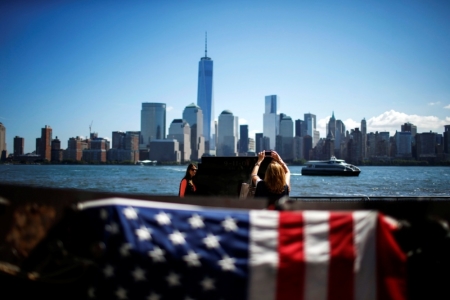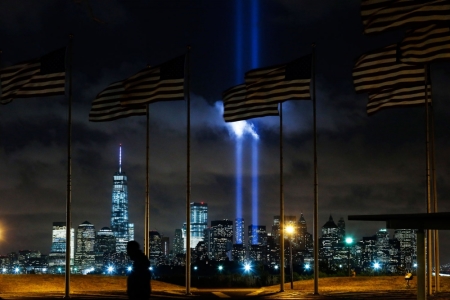Is the US Safer 13 Years After 9/11?

As the United States marks the 13th anniversary of the Sept. 11, 2001, terror attacks, a nationwide poll has found that many Americans do not feel any safer today. The sentiment has been echoed by a number of politicians who continue ringing the warning bells on terror group ISIS and the rise of Islamic extremists who have the means to attack the U.S.
A NBC News/Wall Street Journal poll released on Monday found that 47 percent of Americans believe that the country is less safe now than before 9/11.
Only 26 percent felt that the U.S. is safer now than before the al-Qaeda-organized attacks that destroyed the Twin Towers of the World Trade Center in New York City and hit the Pentagon in Washington, killing close to 3,000 people. Another 26 percent answered that about the same level of threat exists.
NBC noted that even in September 2002, only 20 percent of respondents to the survey believed America is less safe than before the attacks.
"A very war-weary country … seems to have woken up to the real threat that ISIS may present," offered Republican pollster Bill McInturff, who conducted this survey with Democratic pollster Peter Hart and his colleagues at Hart Research.
"The beheadings are so chilling to the American public," added Hart. "The only things I think of equal impact are the self-immolations back in Vietnam."

Terror group ISIS, or the Islamic State as it is also known, has led a wide-scale war in Iraq and Syria, capturing several cities and forcing hundreds of thousands of minorities, including many Christians, to flee their ancestral homes.
It has also beheaded two American journalists on camera, which Hart alludes to, sending a message to President Barack Obama to discontinue airstrikes against ISIS targets in Iraq.
An unnamed militant featured in the beheading video of American journalist Steven Sotloff says:
"I'm back, Obama, and I'm back because of your arrogant foreign policy toward the Islamic State. Just as your missiles continue to strike our people, our knife will continue to strike the necks of your people."
The president vowed that the U.S. will not allow such crimes against its citizens to go unpunished.
"Those who make the mistake of harming Americans will learn that we will not forget ... that our reach is long and that justice will be served," Obama said following the release of the video.
"Our objective is clear. That is to degrade and destroy (ISIS) so it's no longer a threat. We can accomplish that. It's going to take some time, it's going to take some effort."

In his much-anticipated speech Wednesday on the U.S.'s strategy against ISIS, Obama said that the U.S. will conduct more airstrikes against ISIS not only in Iraq but also in Syria, where many of the terror group's leadership are located. He also said that the U.S. will lead a broad international coalition against ISIS, but will not send American combat troops to fight the terror group on the ground. And The New York Times reported shortly after the president's speech that Saudi Arabia has agreed to allow training bases for moderate Syrian opposition fighters that are anti-ISIS in itscountry.
The White House noted in a statement on Monday that Obama will be looking at key national security questions on the anniversary of 9/11.
"The president's national security team is continuing to take measures to prevent attacks against the homeland and ensure the protection of U.S. persons and facilities abroad – the Administration's top national security priorities," the office of the press secretary stated.
Politicians such as Sen. Lindsey Graham, R-South Carolina, have warned that despite numerous changes in leadership across the Middle East region in the past 13 years, there are now more safe havens for terrorists.
"I think the big fear I have about what we're doing in Afghanistan is that we have great capability now. We can watch a part of the world that is a safe haven for terrorists," Graham said on CBS's "Face the Nation" in July.
"Thirteen years after 9/11, there are more safe havens. There are more terrorist groups with more weapons and more capabilities than before 9/11, and we're having less capability, less presence."
Another CNN/ORC International poll earlier this week found that Americans are increasingly concerned by ISIS, and see it as a direct threat to the country.
The results found that seven in 10 Americans believe that ISIS has the capabilities to launch an attack on the U.S. While 72 percent backed additional airstrikes on the terror group, 61 percent of respondents opposed the idea of sending ground troops.
"Americans are significantly less reluctant to use military force than they were a year ago, and the number who say that terrorism is the country's most important problem has quadrupled, making it second only to the economy on the list of top problems in the public's mind," CNN Polling Director Keating Holland said.
In an opinion article for The New York Times on August 29, Graham and Sen. John McCain, R-Arizona, stated that ISIS has become one of the largest and richest terrorist groups in history.
The Republican senators noted that the Islamic militants have established a safe haven the size of Indiana in the heart of the Middle East, and that thousands of its fighters hold Western passports, including some Americans – meaning they could easily travel to the U.S.
"This is why the secretary of homeland security has called Syria 'a matter of homeland security.' His warnings about ISIS have been echoed by the attorney general, the director of national intelligence and, now, the secretary of defense," the article continued.
"Americans need to know that ISIS is not just a problem for Iraq and Syria. It is a threat to the United States. doing too little to combat ISIS has been a problem. Doing less is certainly not the answer now."





















